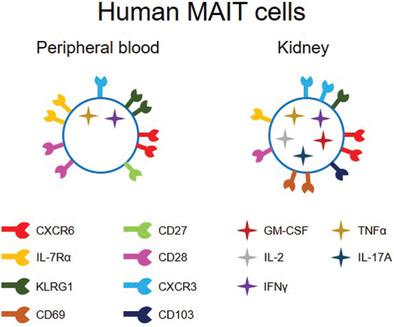当前位置:
X-MOL 学术
›
Eur. J. Immunol.
›
论文详情
Our official English website, www.x-mol.net, welcomes your
feedback! (Note: you will need to create a separate account there.)
Tissue-resident mucosal-associated invariant T (MAIT) cells in the human kidney represent a functionally distinct subset.
European Journal of Immunology ( IF 4.5 ) Pub Date : 2020-07-11 , DOI: 10.1002/eji.202048644 Matty L Terpstra 1, 2, 3 , Ester B M Remmerswaal 2 , Nelly D van der Bom-Baylon 2 , Marjan J Sinnige 2 , Jesper Kers 4, 5, 6 , Michiel C van Aalderen 2 , Suzanne E Geerlings 3 , Frederike J Bemelman 1
European Journal of Immunology ( IF 4.5 ) Pub Date : 2020-07-11 , DOI: 10.1002/eji.202048644 Matty L Terpstra 1, 2, 3 , Ester B M Remmerswaal 2 , Nelly D van der Bom-Baylon 2 , Marjan J Sinnige 2 , Jesper Kers 4, 5, 6 , Michiel C van Aalderen 2 , Suzanne E Geerlings 3 , Frederike J Bemelman 1
Affiliation

|
Mucosal‐associated invariant T (MAIT) cells are innate‐like T‐cells that recognize bacterial riboflavin metabolites. They are present in human blood but are abundant at barrier sites, including the liver, lungs, and kidneys, where they possess a CD69+/CD103+/− tissue‐resident phenotype. In renal tissue, MAIT cells likely defend against the ascending uropathogens responsible for urinary tract infections (UTIs), which are common, especially among renal transplant recipients (RTRs). Nevertheless, the functional role for MAIT cells in renal tissue and the influence of renal transplantation on MAIT cells remains unclear. Using multiparameter flow cytometry and the MR1‐tetramer, we characterized MAIT cell phenotype and function in healthy renal tissue (n = 6), renal transplants explanted after allograft failure (n = 14) and in blood from healthy controls (n = 20) and RTRs before and 1‐year after transplantation (n = 21). MAIT cells in renal tissue constitute a distinct CD69+CD103+/− population that displays typical phenotypic features of tissue‐resident T‐cells and is skewed toward IL‐2, GM‐CSF, and IL‐17A production upon stimulation. The circulating MAIT cell population was not decreased in number in RTRs pre‐ or post‐transplantation. Tissue‐resident MAIT cells in the kidney represent a functionally distinct population. This shows how MAIT cells in the kidney may be involved in the protection against microorganisms.
中文翻译:

人肾脏中与组织黏膜相关的不变T(MAIT)细胞代表功能上不同的子集。
粘膜相关不变T(MAIT)细胞是先天性T细胞,可识别细菌核黄素代谢产物。它们存在于人血中,但在包括CD69 + / CD103 +/-在内的肝脏,肺和肾脏等屏障部位丰富组织驻留表型。在肾脏组织中,MAIT细胞可能抵御引起尿路感染(UTI)的上升的尿路致病菌,这种病很常见,尤其是在肾移植受者(RTR)中。然而,尚不清楚MAIT细胞在肾组织中的功能作用以及肾移植对MAIT细胞的影响。使用多参数流式细胞仪和MR1-四聚体,我们表征了健康肾脏组织(n = 6),同种异体移植失败后(n = 14)和健康对照者血液(n = 20)中肾移植的MAIT细胞表型和功能。移植前后1年的RTR(n = 21)。肾组织中的MAIT细胞构成独特的CD69 + CD103 +/-种群表现出组织驻留T细胞的典型表型特征,并在刺激后偏向IL-2,GM-CSF和IL-17A产生。移植前后,RTRs中循环的MAIT细胞数量并未减少。肾脏中的组织驻留MAIT细胞代表功能上不同的种群。这表明肾脏中的MAIT细胞可能如何参与针对微生物的保护。
更新日期:2020-07-11
中文翻译:

人肾脏中与组织黏膜相关的不变T(MAIT)细胞代表功能上不同的子集。
粘膜相关不变T(MAIT)细胞是先天性T细胞,可识别细菌核黄素代谢产物。它们存在于人血中,但在包括CD69 + / CD103 +/-在内的肝脏,肺和肾脏等屏障部位丰富组织驻留表型。在肾脏组织中,MAIT细胞可能抵御引起尿路感染(UTI)的上升的尿路致病菌,这种病很常见,尤其是在肾移植受者(RTR)中。然而,尚不清楚MAIT细胞在肾组织中的功能作用以及肾移植对MAIT细胞的影响。使用多参数流式细胞仪和MR1-四聚体,我们表征了健康肾脏组织(n = 6),同种异体移植失败后(n = 14)和健康对照者血液(n = 20)中肾移植的MAIT细胞表型和功能。移植前后1年的RTR(n = 21)。肾组织中的MAIT细胞构成独特的CD69 + CD103 +/-种群表现出组织驻留T细胞的典型表型特征,并在刺激后偏向IL-2,GM-CSF和IL-17A产生。移植前后,RTRs中循环的MAIT细胞数量并未减少。肾脏中的组织驻留MAIT细胞代表功能上不同的种群。这表明肾脏中的MAIT细胞可能如何参与针对微生物的保护。









































 京公网安备 11010802027423号
京公网安备 11010802027423号